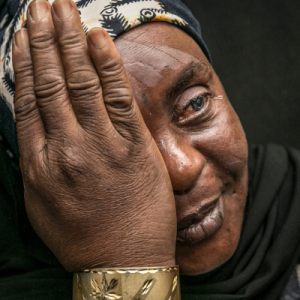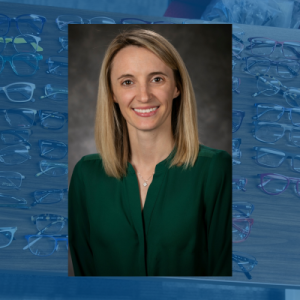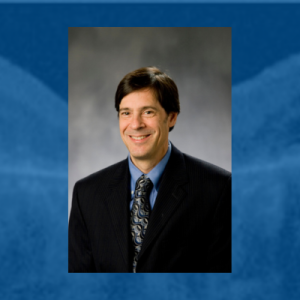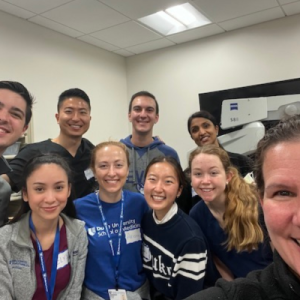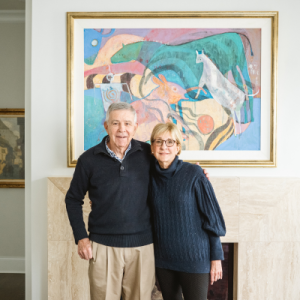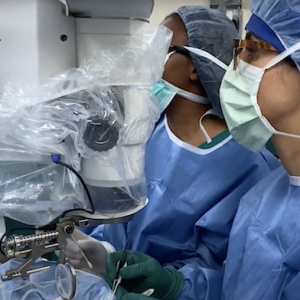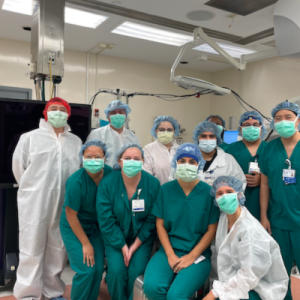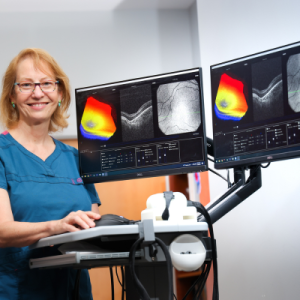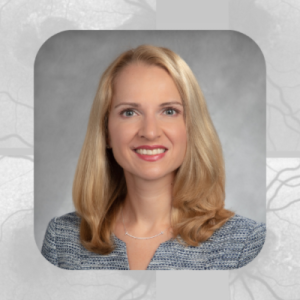
Duke is pioneering innovative research, education, and clinical care – a sense of renewal that is propelling the future of ophthalmology.
Eyes on a Miracle
In West Africa, Duke eye surgeon is helping local doctors restore sight to the blind, a mission that is both easier and harder than you’d think.
Balu Sesay had been blind for 29 years when Lloyd Williams, MD, PhD first met her. It was a sweltering day in July 2021, in a small hospital exam room in Freetown, the bustling port capital of Sierra Leone. Williams saw immediately that both of Sesay’s eyes were badly damaged, the right one completely ruined and a milky haze covering the left, both the result of injuries she sustained as a teenager.
A Life of Service for People with Disabilities
When Melissa Daluvoy, MD, was a high school track and field athlete in a small town in Pennsylvania, a friend’s father asked her to help out with a Special Olympics event he was organizing.
She said yes, little knowing it was the first step of a lifelong journey.
Daluvoy never stopped volunteering with the Special Olympics. “It’s really rewarding,” she says. “The athletes are truly appreciative of any help you give. It’s always a great day and when you leave, you feel happy.”
From One Room to Worldwide Recognition
Around the world, investigators depend on Duke Reading Center to interpret optical coherence
tomography (OCT), visual field and other ophthalmic images to determine treatment efficacy for all stages of clinical trials – from early phase testing to phase four.
Study of Retinal Ganglion Cells Leads to a Passion for Education
Education is a passion for Jullia Rosdahl, MD, PhD, associate professor of ophthalmology and director of the medical student program at Duke Eye Center. She is passionate about medical education, patient education and the importance of wellness and taking care of yourself.
Gift Supports Duke Ophthalmology Training Program
In the decades since Peter Holland, MD, completed his residency training at Duke Eye Center in 1975, he and his wife Merle have lived and worked in Boston, Washington, Houston, and Chicago. But no matter their address, they have always savored fond memories of Duke and Durham. “My experience at Duke was wonderful,” Peter says.
It was a special time for Merle too. “We made lifelong friends with the other residents,” she says. “It was an idyllic time for both of us.”
Bench to Bedside and Back
The Clinical Research Unit at Duke Eye Center is Delivering Hope to Patients Now, and in the Future
Gene Therapy Aims to Help Eyes Produce their Own Medicine
New Macular Degeneration Treatments on the Horizon
Duke Eye Center is participating in two pivotal gene therapy clinical trials that may become promising treatments for age-related macular degeneration, the most common cause of vision loss and blindness in older Americans.
The studies, ATMOSPHERE and ASCENT are large multisite trials, and Duke is the lead site for the latter.
Both treatments involve a novel gene therapy that essentially turns the eye into a “biofactory” that produces its own medicine.
An Engineer at Heart
Cynthia Toth's 25 years of revolutionizing eye care and surgery
As Cynthia Toth, MD, prepares to "dive" inside the eye, she practices a relaxed mind. "Slow
breath, focus, concentrate," she tells herself. In 30 years as a retinal surgeon, she has trained to make her left hand as proficient as her right, so she can smoothly reach the part of the retina she needs to.
A New Era in Dry AMD Treatment
FDA Approves First Treatment for Geographic Atrophy
On February 17, 2023, the U.S. Food and Drug Administration (FDA) approved a groundbreaking treatment to treat geographic atrophy (GA), an advanced form of dry macular degeneration (AMD). Eleonora Lad, MD, PhD, director of clinical research and associate professor, was a lead investigator in the OAKS trial, a pivotal clinical trial that supported the FDA approval.
